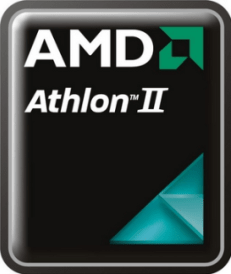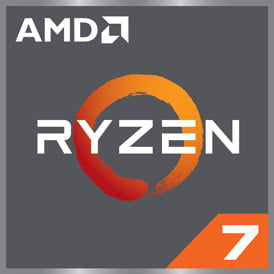
AMD Athlon II X4 640 vs AMD Ryzen 7 2700
Last updated:
CPU comparison with benchmarks

|
 |

|
| AMD Athlon II X4 640 | AMD Ryzen 7 2700 | |
CPU comparisonIn this CPU comparison, we compare the AMD Athlon II X4 640 and the AMD Ryzen 7 2700 and use benchmarks to check which processor is faster.
We compare the AMD Athlon II X4 640 4 core processor released in Q2/2010 with the AMD Ryzen 7 2700 which has 8 CPU cores and was introduced in Q2/2018. |
||
| AMD Athlon II (52) | Family | AMD Ryzen 7 (67) |
| AMD Athlon II X4 (Propus) (10) | CPU group | AMD Ryzen 2000 (9) |
| 1 | Generation | 2 |
| Propus | Architecture | Pinnacle Ridge (Zen+) |
| Desktop / Server | Segment | Desktop / Server |
| -- | Predecessor | -- |
| AMD Athlon II X4 740 | Successor | -- |
|
|
||
CPU Cores and Base FrequencyThe AMD Athlon II X4 640 is a 4 core processor with a clock frequency of 3.00 GHz. The processor can compute 4 threads at the same time. The AMD Ryzen 7 2700 clocks with 3.20 GHz (4.10 GHz), has 8 CPU cores and can calculate 16 threads in parallel. |
||
| AMD Athlon II X4 640 | Characteristic | AMD Ryzen 7 2700 |
| 4 | Cores | 8 |
| 4 | Threads | 16 |
| normal | Core architecture | normal |
| No | Hyperthreading | Yes |
| No | Overclocking ? | Yes |
| 3.00 GHz | Frequency | 3.20 GHz |
| -- | Turbo Frequency (1 Core) | 4.10 GHz |
| -- | Turbo Frequency (All Cores) | 3.60 GHz |
Memory & PCIeUp to 16 GB of memory in a maximum of 2 memory channels is supported by the AMD Athlon II X4 640, while the AMD Ryzen 7 2700 supports a maximum of 64 GB of memory with a maximum memory bandwidth of 46.9 GB/s enabled. |
||
| AMD Athlon II X4 640 | Characteristic | AMD Ryzen 7 2700 |
| DDR3-1333 | Memory | DDR4-2933 |
| 16 GB | Max. Memory | 64 GB |
| 2 (Dual Channel) | Memory channels | 2 (Dual Channel) |
| 21.3 GB/s | Max. Bandwidth | 46.9 GB/s |
| No | ECC | Yes |
| 2.00 MB | L2 Cache | -- |
| -- | L3 Cache | 16.00 MB |
| 2.0 | PCIe version | 3.0 |
| -- | PCIe lanes | 20 |
| -- | PCIe Bandwidth | 19.7 GB/s |
Thermal ManagementThe AMD Athlon II X4 640 has a TDP of 95 W. The TDP of the AMD Ryzen 7 2700 is 65 W. System integrators use the TDP of the processor as a guide when dimensioning the cooling solution. |
||
| AMD Athlon II X4 640 | Characteristic | AMD Ryzen 7 2700 |
| 95 W | TDP (PL1 / PBP) | 65 W |
| -- | TDP (PL2) | -- |
| -- | TDP up | -- |
| -- | TDP down | -- |
| -- | Tjunction max. | 95 °C |
Technical detailsThe AMD Athlon II X4 640 has 2.00 MB cache and is manufactured in 45 nm. The cache of AMD Ryzen 7 2700 is at 16.00 MB. The processor is manufactured in 12 nm. |
||
| AMD Athlon II X4 640 | Characteristic | AMD Ryzen 7 2700 |
| 45 nm | Technology | 12 nm |
| Unknown | Chip design | Chiplet |
| x86-64 (64 bit) | Instruction set (ISA) | x86-64 (64 bit) |
| MMX, 3DNow!, SSE3, SSE4a | ISA extensions | SSE4a, SSE4.1, SSE4.2, AVX2, FMA3 |
| AM3 | Socket | AM4 (PGA 1331) |
| AMD-V | Virtualization | AMD-V, SVM |
| No | AES-NI | Yes |
| Windows 10, Linux | Operating systems | Windows 10, Windows 11, Linux |
| Q2/2010 | Release date | Q2/2018 |
| -- | Release price | 290 $ |
| show more data | show more data | |
Rate these processors
Average performance in benchmarks
⌀ Single core performance in 4 CPU benchmarks
⌀ Multi core performance in 6 CPU benchmarks
Cinebench R23 (Single-Core)
Cinebench R23 is the successor of Cinebench R20 and is also based on the Cinema 4 Suite. Cinema 4 is a worldwide used software to create 3D forms. The single-core test only uses one CPU core, the amount of cores or hyperthreading ability doesn't count.
|
|
AMD Athlon II X4 640
4C 4T @ 3.00 GHz |
||
|
|
AMD Ryzen 7 2700
8C 16T @ 4.10 GHz |
||
Cinebench R23 (Multi-Core)
Cinebench R23 is the successor of Cinebench R20 and is also based on the Cinema 4 Suite. Cinema 4 is a worldwide used software to create 3D forms. The multi-core test involves all CPU cores and taks a big advantage of hyperthreading.
|
|
AMD Athlon II X4 640
4C 4T @ 3.00 GHz |
||
|
|
AMD Ryzen 7 2700
8C 16T @ 3.60 GHz |
||
Geekbench 5, 64bit (Single-Core)
Geekbench 5 is a cross plattform benchmark that heavily uses the systems memory. A fast memory will push the result a lot. The single-core test only uses one CPU core, the amount of cores or hyperthreading ability doesn't count.
|
|
AMD Athlon II X4 640
4C 4T @ 3.00 GHz |
||
|
|
AMD Ryzen 7 2700
8C 16T @ 4.10 GHz |
||
Geekbench 5, 64bit (Multi-Core)
Geekbench 5 is a cross plattform benchmark that heavily uses the systems memory. A fast memory will push the result a lot. The multi-core test involves all CPU cores and taks a big advantage of hyperthreading.
|
|
AMD Athlon II X4 640
4C 4T @ 3.00 GHz |
||
|
|
AMD Ryzen 7 2700
8C 16T @ 3.60 GHz |
||
Cinebench R20 (Single-Core)
Cinebench R20 is the successor of Cinebench R15 and is also based on the Cinema 4 Suite. Cinema 4 is a worldwide used software to create 3D forms. The single-core test only uses one CPU core, the amount of cores or hyperthreading ability doesn't count.
|
|
AMD Athlon II X4 640
4C 4T @ 3.00 GHz |
||
|
|
AMD Ryzen 7 2700
8C 16T @ 4.10 GHz |
||
Cinebench R20 (Multi-Core)
Cinebench R20 is the successor of Cinebench R15 and is also based on the Cinema 4 Suite. Cinema 4 is a worldwide used software to create 3D forms. The multi-core test involves all CPU cores and taks a big advantage of hyperthreading.
|
|
AMD Athlon II X4 640
4C 4T @ 3.00 GHz |
||
|
|
AMD Ryzen 7 2700
8C 16T @ 3.60 GHz |
||
Estimated results for PassMark CPU Mark
Some of the CPUs listed below have been benchmarked by CPU-monkey. However the majority of CPUs have not been tested and the results have been estimated by a CPU-monkey’s secret proprietary formula. As such they do not accurately reflect the actual Passmark CPU mark values and are not endorsed by PassMark Software Pty Ltd.
|
|
AMD Athlon II X4 640
4C 4T @ 3.00 GHz |
||
|
|
AMD Ryzen 7 2700
8C 16T @ 3.60 GHz |
||
CPU-Z Benchmark 17 (Multi-Core)
The CPU-Z benchmark measures a processor's performance by measuring the time it takes the system to complete all benchmark calculations. The faster the benchmark is completed, the higher the score.
|
|
AMD Athlon II X4 640
4C 4T @ 3.00 GHz |
||
|
|
AMD Ryzen 7 2700
8C 16T @ 3.20 GHz |
||
Cinebench R15 (Single-Core)
Cinebench R15 is the successor of Cinebench 11.5 and is also based on the Cinema 4 Suite. Cinema 4 is a worldwide used software to create 3D forms. The single-core test only uses one CPU core, the amount of cores or hyperthreading ability doesn't count.
|
|
AMD Athlon II X4 640
4C 4T @ 3.00 GHz |
||
|
|
AMD Ryzen 7 2700
8C 16T @ 4.10 GHz |
||
Cinebench R15 (Multi-Core)
Cinebench R15 is the successor of Cinebench 11.5 and is also based on the Cinema 4 Suite. Cinema 4 is a worldwide used software to create 3D forms. The multi-core test involves all CPU cores and taks a big advantage of hyperthreading.
|
|
AMD Athlon II X4 640
4C 4T @ 3.00 GHz |
||
|
|
AMD Ryzen 7 2700
8C 16T @ 3.60 GHz |
||
Geekbench 6 (Single-Core)
Geekbench 6 is a benchmark for modern computers, notebooks and smartphones. What is new is an optimized utilization of newer CPU architectures, e.g. based on the big.LITTLE concept and combining CPU cores of different sizes. The single-core benchmark only evaluates the performance of the fastest CPU core, the number of CPU cores in a processor is irrelevant here.
|
|
AMD Athlon II X4 640
4C 4T @ 3.00 GHz |
||
|
|
AMD Ryzen 7 2700
8C 16T @ 4.10 GHz |
||
Geekbench 6 (Multi-Core)
Geekbench 6 is a benchmark for modern computers, notebooks and smartphones. What is new is an optimized utilization of newer CPU architectures, e.g. based on the big.LITTLE concept and combining CPU cores of different sizes. The multi-core benchmark evaluates the performance of all of the processor's CPU cores. Virtual thread improvements such as AMD SMT or Intel's Hyper-Threading have a positive impact on the benchmark result.
|
|
AMD Athlon II X4 640
4C 4T @ 3.00 GHz |
||
|
|
AMD Ryzen 7 2700
8C 16T @ 3.60 GHz |
||
Blender 2.81 (bmw27)
Blender is a free 3D graphics software for rendering (creating) 3D bodies, which can also be textured and animated in the software. The Blender benchmark creates predefined scenes and measures the time (s) required for the entire scene. The shorter the time required, the better. We selected bmw27 as the benchmark scene.
|
|
AMD Athlon II X4 640
4C 4T @ 3.00 GHz |
||
|
|
AMD Ryzen 7 2700
8C 16T @ 3.60 GHz |
||
CPU-Z Benchmark 17 (Single-Core)
The CPU-Z benchmark measures a processor's performance by measuring the time it takes the system to complete all benchmark calculations. The faster the benchmark is completed, the higher the score.
|
|
AMD Athlon II X4 640
4C 4T @ 3.00 GHz |
||
|
|
AMD Ryzen 7 2700
8C 16T @ 3.60 GHz |
||
Devices using this processor |
|
| AMD Athlon II X4 640 | AMD Ryzen 7 2700 |
| Unknown | dercomputerladen Gaming PC mit Ryzen 7 2700 CSL PC Aufrüstkit mit Ryzen 7 2700 |
Popular comparisons containing this CPUs
back to index








